America’s deepening role in Libya
- Share via
In his speech to the nation this week, President Obama drew a distinction between the goals of the no-fly zone in Libya — a NATO-led military endeavor narrowly aimed at protecting civilians from a humanitarian disaster — and separate, nonmilitary efforts by the United States to remove Moammar Kadafi from power.
“The world would be better off without Kadafi,” Obama said, but “broadening our military mission to include regime change would be a mistake.” Instead, he said, the U.S. would rely on tactics such as denying the regime arms, cutting off its cash and “assisting the opposition” to hasten Kadafi’s downfall.
Now, however, the president may be blurring the distinction between military and nonmilitary measures. First, the administration is considering arming the rebels, an option Secretary of State Hillary Rodham Clinton said was consistent with the United Nations resolution authorizing the no-fly zone. There also is a report that Obama has signed a secret presidential “finding” authorizing covert aid to the rebels. And finally, it was reported this week that CIA operatives are already on the ground in Libya.
None of these initiatives contradicts the president’s assurances that he won’t commit American ground troops to Libya. But each raises the possibility of a growing military alliance with the rebels. And history suggests that even a limited relationship can lead to a larger commitment, including, ultimately, the deployment of U.S. forces.
Arming rebel troops and stationing CIA operatives in the country might seem to be different sorts of activities, and to some extent they are. CIA agents can provide Washington with valuable intelligence about the rebels, who are still an unknown quantity and who are suspected by some of harboring Al Qaeda followers and other extremists. To the extent that the United States is getting involved in Libya’s internal politics, gathering that kind of intelligence — as well as information about Kadafi’s regime — seems absolutely essential.
But, as its experience in Pakistan demonstrates, the CIA also functions these days in a military capacity, flying drones in bombing missions, for example, and carrying out other tactical operations. If the CIA were to engage in those kinds of activities in Libya, it would violate the spirit of Obama’s promise and pull the U.S. even more deeply into another country’s civil war.
Arming the rebels seems even harder to reconcile with Obama’s insistence that he is seeking to oust Kadafi through nonmilitary means. By definition, providing weapons is a military activity, as is training the recipients to use them (which is often a necessary next step). Both would cement the United States and the rebels as allies. Not only don’t Americans know much about these new allies in a faraway part of the world, but what happens if, at some point, one ally asks another for more than weapons?
Some will see these developments as proof that, whatever he said, the president is determined to use military power to unseat Kadafi. We’re not that cynical. From the beginning, there has been some inevitable overlap between the U.N.-sanctioned mission of protecting civilians and the military campaign by the rebels. Targeting Kadafi’s forces served the interests both of protecting civilians and of improving the rebels’ position. Even now, U.S. officials would not be disappointed if air raids aimed at protecting civilians also hastened the end of Kadafi’s rule.
But that is different from intervention designed solely to help the rebels take power. That would not be in the best interests of the United States, which is why Obama’s division of labor made sense. With U.S. forces already committed in Afghanistan and Iraq, the American people are understandably wary of further military involvement.
As the president said, there is an array of nonmilitary measures that can be taken to encourage Kadafi’s exit. The administration should concentrate on making them succeed, while ensuring that it doesn’t find itself in a new, unpopular war of choice from which it cannot easily extricate itself.
More to Read
A cure for the common opinion
Get thought-provoking perspectives with our weekly newsletter.
You may occasionally receive promotional content from the Los Angeles Times.






